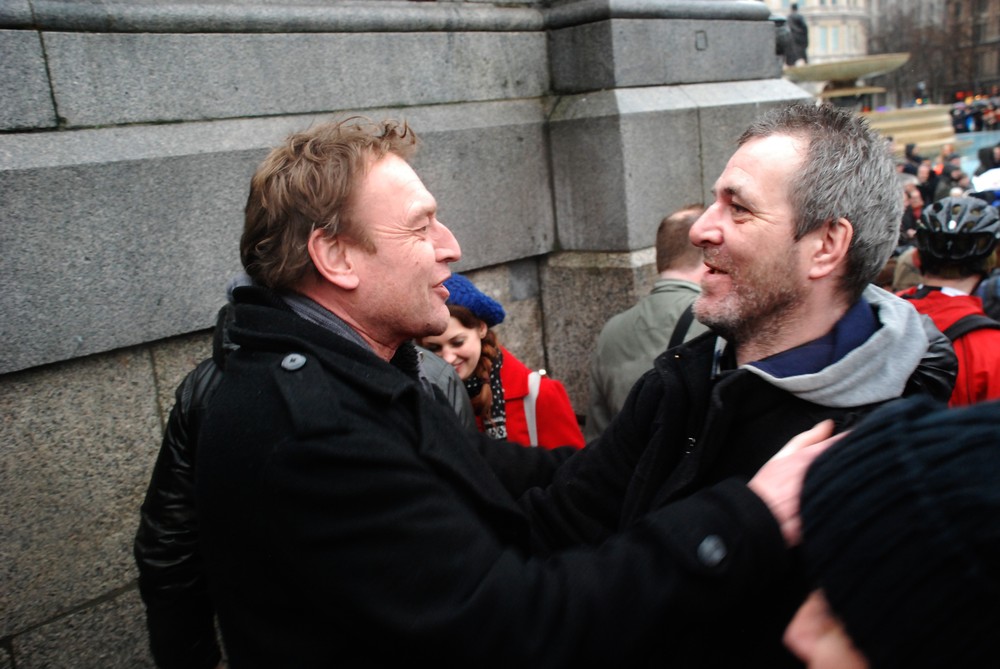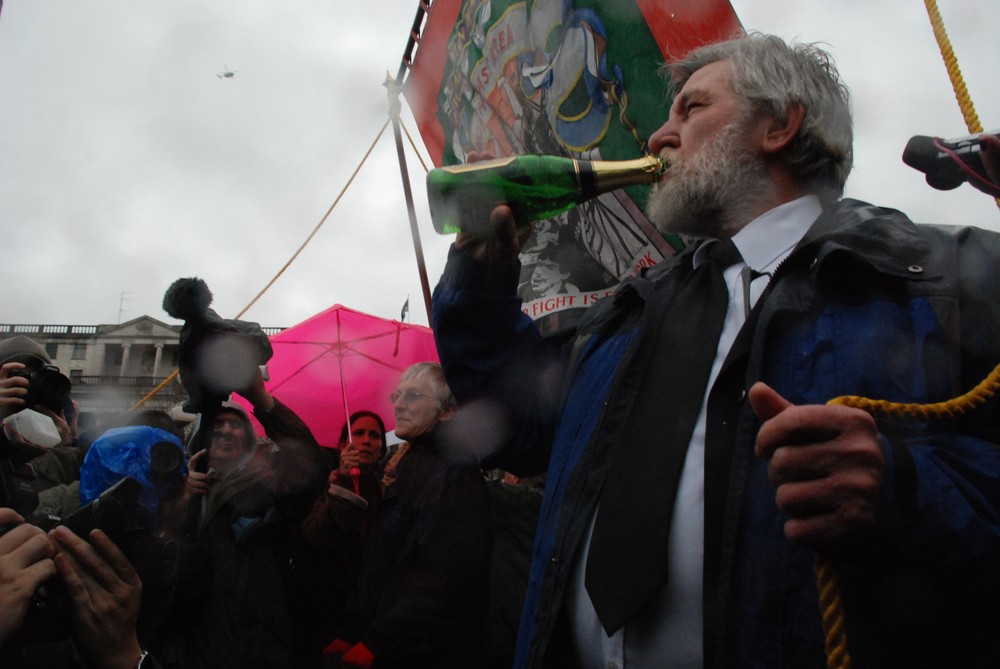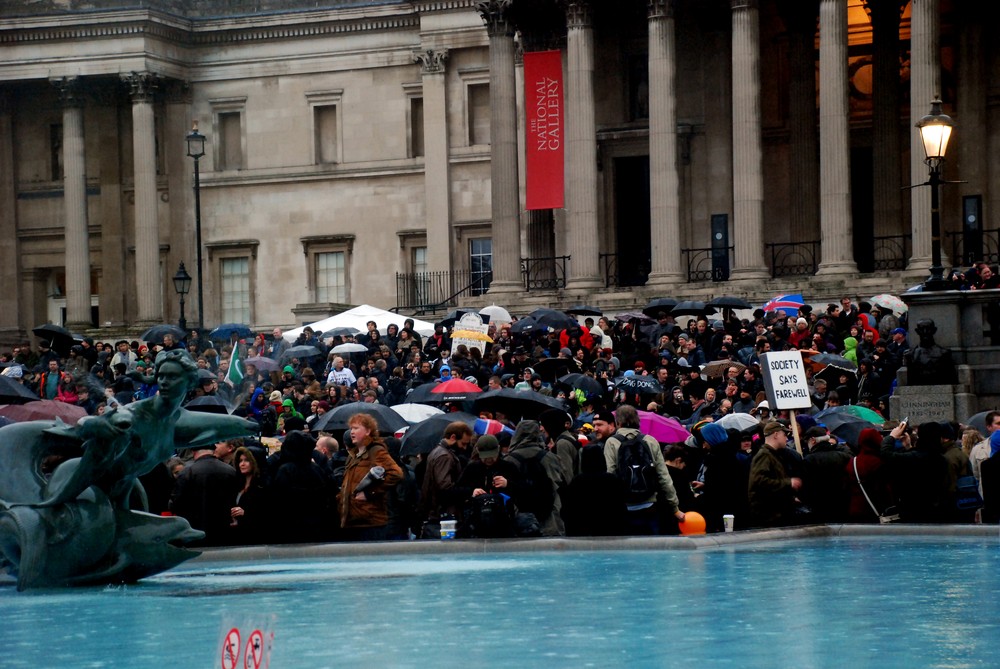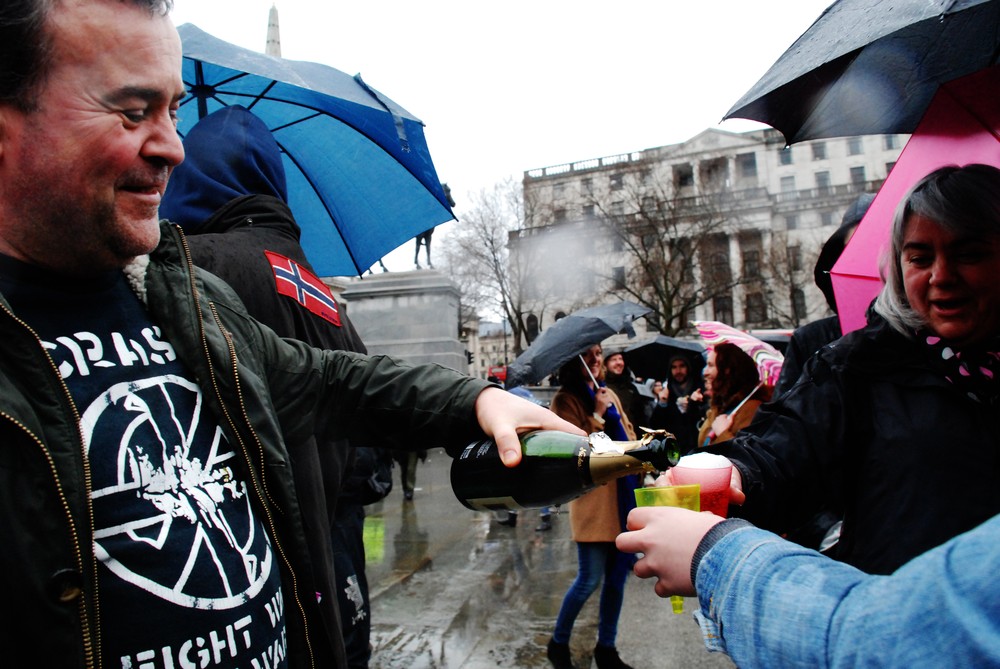
Thatcher was a vociferous proponent of the privatisation agenda, and many saw her as one of Ronald Reagan's leading ideological inspirations.

A small coven of "witches" from Ireland recalled Thatcher's legacy in Northern Ireland. Sinn Fein leader Gerry Adams said last week that Thatcher had "caused great hurt to the Irish and British people" during her terms in office. "Working class communities were devastated in Britain because of her policies," he said. "Margaret Thatcher will be especially remembered for her shameful role during the epic hunger strikes of 1980 and 81. Her Irish policy failed miserably."

Old friends reunited at the gathering in Trafalgar Square, London's traditional location for rallies, protests and other public events.

With a party atmosphere, many revellers joined a conga line. The song, "Ding, dong, the witch is dead", from The Wizard of Oz, raced to the top of the UK sales charts this week - sparking a controversy over whether or not it would be played by BBC radio during its regular chart show.

A proud advocate of the idea of individualism being better than collectivism, Thatcher made few friends on the left during the final days of the Cold War. "Socialists cry 'Power to the people', and raise the clenched fist as they say it," she told her party's leaders in 1986. "We all know what they really mean - power over people, power to the state."

Punks and anarchists comprised a large number - but not all - of the partying protesters. The phrase 'Gotcha!' refers to an infamous 1982 headline after the sinking of the Argentinian Belgrano warship during the Falklands War. Thatcher agreed to the strike on the Belgrano, which was outside of an exclusion zone set up around the islands - and believed to be heading away from the Falklands. More than 300 Argentinian lives were lost in the attack, which Argentinian President Christine Kirchner described as a "war crime". Thatcher remained characteristically unrepentant.

Many expected the crowd to swell with football fans and drunken louts, but the event remained good natured - if damp.

A former miner from the north-west of England toasted Thatcher's demise with champagne. During her tenure, dozens of coal mines were shut down, leaving thousands of people out of work and some of Britain's most vulnerable communities blighted. Thatcher's success in breaking the miners' strike of 1984 forever diminished the power once held by trade unions in Britain, severing a critical link between production and capital.

Aneurin Bevan, the source of this quote, was the son of a Welsh coal miner who eventually became minister of health in Clement Atlee's government. A fervent champion of social justice and the rights of workers, Nye Bevan spearheaded the creation of the National Health Service. With increased privatisation of the NHS, and the selling-off of many state industries and services - beginning with Thatcher's tenure to the current government - his sentiments regarding the Conservative Party are shared by many in Britain today.

Police officers showed up in force, but had few incidents to deal with. In 1981, Thatcher told reporters: "My policies are based not on some economics theory, but on things I and millions like me were brought up with: an honest day's work for an honest day's pay; live within your means; put by a nest egg for a rainy day; pay your bills on time; support the police." Some 16 people were held by police in custody, mostly for being "drunk and disorderly".

The "celebration" was not considered in good taste by everyone. While some at the demonstration said they wanted to mark the historic occasion, rather than party, the anger over the effects of Thatcher's policies in communities across the land remained palpable.

Trafalgar Square was also the location of the infamous 1990 "Poll Tax Riots". Thatcher introduced the flat tax, widely seen as regressive, which was supported by just 12 percent of people. Protesters re-enacted the "Peasants' Revolt" of 1381 - sparked by the introduction of a similar tax by Richard II - and hundreds of thousands arrived in central London. The tax, the riot and the government response to both have been widely credited with leading to Thatcher's fall from power later that year.

Revellers drank cider and champagne under umbrellas in the rain. Police said the last of the protesters left the Square at around 2am, and there had been no reports of damage to property.
London, United Kingdom - Anarchist group Class War has, for decades now, been circulating the idea that, on the first Saturday after the death of former British Prime Minister Margaret Thatcher, those opposed to her divisive leadership should head for London's Trafalgar Square to celebrate her demise.
The grisly nature of partying after the death of an elderly
woman may be seen as being in poor taste by many. It was, however, perhaps
inevitable that such an event would take place, given the depth of bitterness
held by many in those communities which were blighted by coal mine closures,
rampant privatisation and the imposition of a radically right-wing social and
economic agenda.
"I am not surprised by the parties, which show that
events of 30-40 years ago still engender that kind of violent reaction -
because her reign was very divisive and controversial, and people still
remember that today," the Right Reverent Tim Ellis, Bishop of Grantham,
told the BBC.
Former miners travelled from the England's north-east,
proudly displaying the banner of their trade union.
One former pit worker from a town ravaged by years of
unemployment following Thatcher's closures drank champagne and told Al Jazeera
that he was "glad" she was dead.
The notorious British rain poured down, but failed to dampen
spirits of those gathered, who stayed in the square until around 2am.
Further protests are expected on the day of Thatcher's
controversial ceremonial £10 million ($15m) funeral. Protesters have been given
the go-ahead by police to turn their backs to the former prime minister's
coffin as it makes its way through central London, but officers have warned
that anyone causing "harassment" would likely face arrest.
The Queen, former Prime Minister Tony Blair, US politician
Newt Gingrich and FW deKlerk, the last white president of South Africa, will be
attending the funeral.
No comments:
Post a Comment